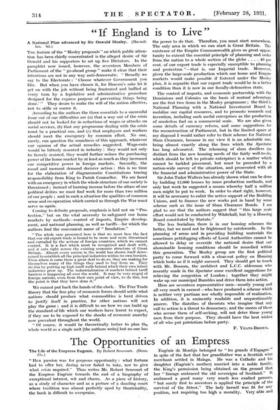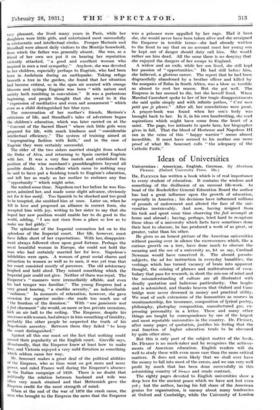The Opportunities of an Empress
The Life of the Empress Eugenie. By Robert Sencourt. (Benn. 21s.) "HER passion was for gorgeous opportunity : what fortune had to offer her, daring never failed to take, nor to give what crisis required." Thus writes Mr. Robert Sencourt of the Empress Eugenie towards the end of a biography of exceptional interest, wit and charm. As a piece of history, as a study of character and as a picture of a dazzling court where tradition was almost perfectly aped by theatricality, the book is difficult to overpraise. Eugenie de Montijo belonged to " les grands d'Espagne " in spite of the fact that her grandfather was a Scottish wine merchant settled in Malaga. He was a Catholic and his daughter (Eugenie's mother) married into a noble family, the King's permission being obtained on the ground that her "lineage embraced the old sovereigns of Scotland." It embraced a good many very much less exalted persons, "but surely first to ancestors is applied the principle of the survival of the fittest." The lady herself was fit for any position, not requiring too high a morality. Very able and very pleasant, she lived many years in Paris, while her daughters were little girls, and entertained most successfully in aristocratic and intellectual circles. Prosper Merimee and Stendhall were almost daily visitors to the Montijo household, from which the father was generally absent. She was, as a friend of her own sex put it on hearing her reputation violently attacked, "a good and excellent woman who inspired in men a real sympathy." Anyhow, she was devoted to her children, especially perhaps to Eugenie, who had been born in Andalusia during an earthquake. Taking refuge beneath a tree in the garden, she found that her situation had become critical, so in the open air scented with orange blossom and syringa Eugenie was born "with nature and society both rumbling in convulsion." It was a portentous beginning, and people thought that she owed to it the "expression of meditative and even sad amazement" which even as a child distinguished her blue eyes.
The conversation of her mother's friends, Merimee's criticisms of life, and Stendhall's tales of adventure began the children's education, which was later carried on at the 'Convent of the Sacred Heart" where rich little girls were prepared for life, with much kindness and "considerable intellectual efficiency." The system of training aimed at impregnating fashion with faith," and in the case of Eugenie they were certainly successful.
The elder of the two sisters married straight from school the Duke of Alva, and returning to Spain carried Eugenie with her. It was a very fine match and established the position of the wine merchant's granddaughters beyond all possible doubt. A love-affair which came to nothing may be said to have put a finishing touch to Eugenie's education, and left her as ready as her mother to embrace any fine " opportunity " which might arise.
She waited some time. Napoleon met her before he was Em- peror, admired her, and made some slight advance, obviously not for le bon motif. Too Spanish to be shocked and too good to be tempted, she snubbed him at once. Later on, when he fell in love and proposed an alliance in correct form, she accepted him with joy, writing to her sister to say that she hoped her new position would enable her to do good in the world, adding, "I am not risen from a place so low as to make me feel giddy."
The splendour of the Imperial coronation led on to the splendour of the Imperial court. Her life, however, must have fallen short of her expectations. With her, disappoint- ment always followed close upon good fortune. Perhaps the most beautiful woman in Europe, she could not hold the man who had certainly married her for love. Napoleon's infidelities were open. A woman of great social charm and attraction to women as well as to men, it was yet true that her court consisted Mostly of parvenus. The old aristocracy laughed and held aloof. They missed something which the Imperial pair could not give. Neither of them was royal. The Emperor's "manners were irremediably affable, and even his bad temper was familiar." The young Empress had a very grand bearing, "a starlike serenity," an indescribable "radiance." In moments of relaxation, however, she gave occasion for superior smiles—she made too much use of "the freedom of the dominoe." With "une gaminerie -tout a fait charmante" she would, on more or less private occasions, kick an air-ball to the ceiling. The Emperor, despite his successes with women, had always in him something of timidity, probably like other people he suspected the truth of his Napoleonic ancestry. Between them they failed "to keep the court distinguished."
Against all this one must set the fact that nothing could exceed their popularity at the English court.. Greville says, ill-naturedly, that the Emperor knew at least how to 'make love, and Victoria enjoyed a very mild flirtation as something Which seldom came her way.
Mr. Sencourt makes a great deal of the political abilities of the Empress, who as time went on got more and more Power, and ruled France well during the Emperor's absence in the Italian campaign of 1859. There is no doubt that Politically the relation between husband and wife was Often very much strained and that Metternich gave the Empress credit for the most strength of mind.
When at the end of the war of 1870 the crash came, the men who brought to the Empress the news that the Emperor was a prisoner were appalled by her rage. Had it been she, she would never have been taken alive and she arraigned the Emperor in terrible terms—she had already written to the front to say that on no account must her young son be kept out of danger should duty call him. She would rather see him dead. All the same there is no denying that she enjoyed the dangers of her escape to England.
A widow and an exile, while her son lived, she still kept her passion of "opportunities." He had still before him, she believed, a glorious career. The report that he had been disgracefully abandoned by a brother officer and killed by the assegaies of Zulus in South Africa, was a blow so terrible as almost to cost her reason. But she got well. The Empress in her seemed to die, but she herself lived. When Marshal Canrobert spoke to her of her tragic disappointments she said quite simply and with infinite pathos, " C'esl MOlt petit que je pleure." After all, her consolations were great. A prayer-book was found when her son's body was brought back to her. In it, in his own handwriting, she read aspirations which might have come from the heart of a saint. The page, too intimate to quote here, her biographer gives in full. That the blood of Hortense and Napoleon III ran in the veins of this "happy warrior" seems almost incredible. It must have seemed to his mother one more proof of what Mr. Sencourt calls "the adequacy of the Catholic Faith."












































 Previous page
Previous page